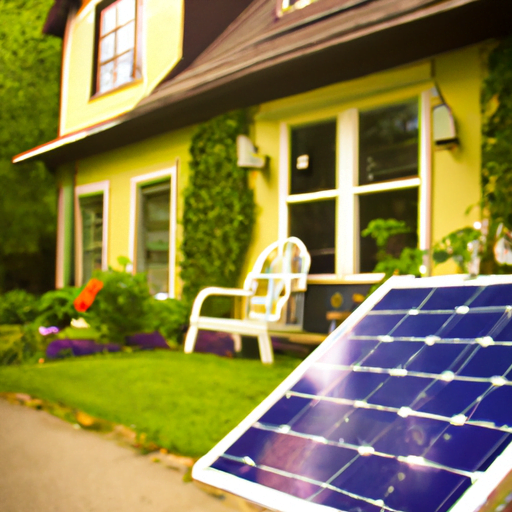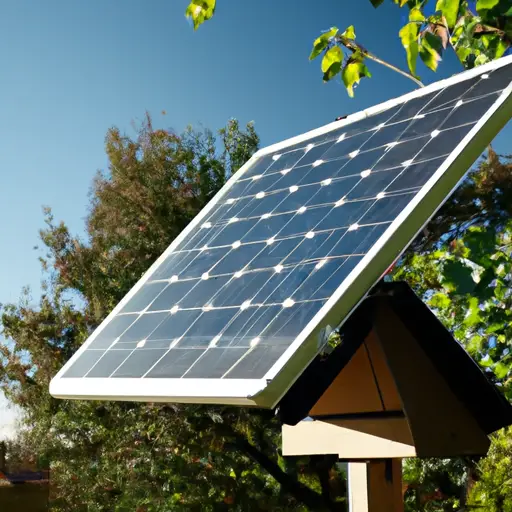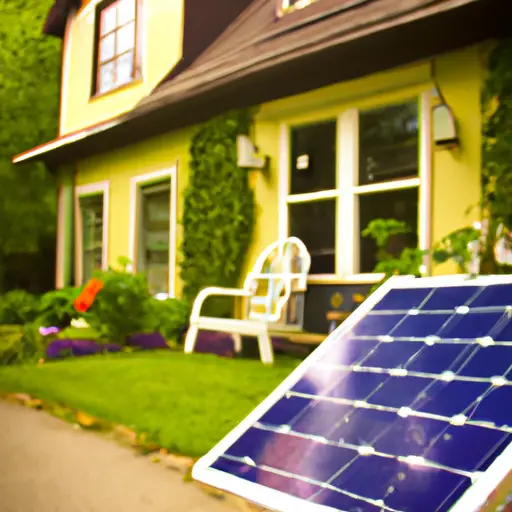So, have you ever wondered what it would be like to live off the grid? You know, ditching all the modern conveniences and being completely self-sustainable? It’s definitely a lifestyle that has gained popularity in recent years, and for good reason. Living off the grid allows you to disconnect from the hustle and bustle of city life and instead embrace a simpler, more sustainable way of living. But what exactly is the purpose of living off the grid? Well, in this article, we’ll delve into the reasons why people choose to live off the grid and explore the different aspects of this lifestyle. Trust me, it’s going to be an eye-opening journey!
Living off the grid means relying on yourself for all your basic needs such as electricity, water, and food. It involves generating your own power, collecting rainwater, growing your own food, and effectively becoming self-sustainable. The main purpose behind this lifestyle is to reduce our dependence on external resources and become more environmentally conscious. By embracing off-grid living, you can greatly reduce your carbon footprint and limit your impact on the planet. Plus, it provides a sense of freedom and self-reliance that is often lost in our modern, consumer-driven society.
But living off the grid is not just about environmental sustainability. It also offers a chance to simplify your life and reconnect with nature. In our fast-paced world, we are constantly bombarded with distractions and expectations that can leave us feeling overwhelmed and disconnected. Living off the grid allows you to escape the chaos and noise, and instead embrace a slower, more intentional way of living. It offers the opportunity to appreciate the beauty of nature, spend more time with loved ones, and focus on what truly matters.
In this article, we’ll dive deeper into the different aspects of living off the grid, including the challenges and rewards that come with it. We’ll explore the various methods of generating power and collecting water, as well as tips for growing your own food and living sustainably. So, if you’re curious about the purpose of living off the grid and are considering this lifestyle change, stay tuned. We’ve got a lot to cover and I guarantee you’ll walk away with a newfound understanding and appreciation for off-grid living. The grid, in this context, refers to the traditional system of electricity, water, and other resources that are provided by public utilities. Living off the grid, on the other hand, means choosing to be self-sufficient and independent by relying on alternative sources of power, managing water and waste, and reducing reliance on external resources.

Definition of living off the grid
Living off the grid is a lifestyle choice where individuals or communities choose to disconnect from the traditional systems of utilities and instead rely on self-generated power, water sources, and waste management systems. This means taking control of one’s own energy consumption, minimizing environmental impact, and embracing a more self-sufficient and sustainable way of life.
Benefits and challenges of living off the grid
Living off the grid offers a variety of benefits, but it also comes with its own set of challenges. Let’s explore both aspects to better understand the purpose behind this alternative lifestyle choice.
One of the main benefits of living off the grid is reducing reliance on external resources. With alternative power sources such as solar panels or wind turbines, individuals can generate their own electricity and no longer have to depend on the grid. This not only decreases monthly expenses but also provides a sense of freedom and independence.
Another benefit is the opportunity to minimize environmental impact. Traditional power sources, such as fossil fuels, contribute to air and water pollution, as well as the emission of greenhouse gases. By living off the grid and relying on renewable energy sources, individuals can significantly reduce their carbon footprint and contribute to a healthier planet.
Living off the grid also empowers self-sufficiency and independence. Being able to generate your own power, manage your own water supply, and utilize waste management systems allows individuals to take control of their own needs. This can lead to a greater sense of empowerment and self-reliance, which can be incredibly fulfilling.
However, living off the grid also comes with its own set of challenges. One of the main challenges is choosing an appropriate location. Certain areas may have more potential for alternative power generation or access to water sources, while others may not be as suitable. It’s important to carefully consider the location to ensure the feasibility of living off the grid.
Setting up alternative sources of power can be another challenge. Depending on the location and energy needs, individuals may need to invest in solar panels, wind turbines, or other renewable energy technologies. This initial investment can be costly, but it can lead to long-term savings and independence from fluctuating energy prices.
Implementing water and waste management systems can also be challenging. Off-grid living often requires individuals to find alternative sources of fresh water, such as rainwater harvesting or well drilling, and to properly manage waste through composting or septic systems. It’s important to have the knowledge and resources to implement these systems effectively.
Despite these challenges, the benefits of living off the grid can be well worth the effort. Not only does it lead to a more sustainable and fulfilling lifestyle, but it also offers the opportunity to achieve financial independence and uncover various health and well-being benefits.

Understanding the Purpose of Living Off the Grid
The purpose of living off the grid goes beyond just disconnecting from the traditional systems of utilities. It is about embracing a more sustainable and self-sufficient way of life that aligns with personal values and priorities. Let’s explore the different aspects of this purpose in more detail.
Reducing reliance on external resources
One of the fundamental purposes of living off the grid is reducing reliance on external resources. By generating your own power, managing your own water supply, and implementing sustainable waste management systems, you become less dependent on public utilities. This not only reduces monthly expenses but also provides a sense of freedom from external influences.
Minimizing environmental impact
Living off the grid also has a significant impact on the environment. By utilizing renewable energy sources, such as solar or wind power, individuals can significantly reduce their carbon footprint and contribute to the fight against climate change. Additionally, implementing sustainable waste management systems and reducing overall resource consumption also helps protect the environment for future generations.
Empowering self-sufficiency and independence
Living off the grid empowers individuals to become more self-sufficient and independent. By taking control of their own energy, water, and waste management, individuals no longer need to rely on public utilities or external services. This sense of empowerment can lead to increased confidence, self-reliance, and a greater sense of personal fulfillment.
Building a Sustainable Off-Grid Lifestyle
Building a sustainable off-grid lifestyle requires careful planning and consideration. Here are some key steps to help you on your journey to living off the grid.
Choosing an appropriate location
The first step in building a sustainable off-grid lifestyle is choosing an appropriate location. Factors to consider include access to renewable energy sources, availability of fresh water, and the suitability of the land for sustainable living. It’s important to do thorough research and seek expert guidance when selecting a location for your off-grid home.
Setting up alternative sources of power
One of the most critical aspects of off-grid living is setting up alternative sources of power. This typically involves investing in renewable energy technologies such as solar panels or wind turbines. It’s important to assess your energy needs and design a system that can meet those needs efficiently. Additionally, having backup power sources, such as generators or batteries, can provide peace of mind during periods of low renewable energy production.
Implementing water and waste management systems
Managing water sources and waste is another crucial aspect of off-grid living. Depending on your location, you may need to implement rainwater harvesting systems, dig wells, or utilize natural bodies of water. It’s important to ensure access to a reliable and sustainable water source. Additionally, proper waste management systems such as composting toilets or septic systems will contribute to a more sustainable and hygienic living environment.

Achieving Financial Independence in Off-Grid Living
Living off the grid can also lead to financial independence. By reducing monthly expenses and embracing sustainable practices, individuals can save money and generate income through sustainable means. Let’s explore some strategies for achieving financial independence in off-grid living.
Reducing monthly expenses
One of the most significant benefits of living off the grid is the potential for reducing monthly expenses. By generating your own power and managing your water supply, you can significantly decrease utility bills. Additionally, embracing a more sustainable lifestyle often leads to reduced consumption, which translates into lower expenses for groceries, transportation, and other daily necessities.
Generating income through sustainable means
Living off the grid offers various opportunities to generate income through sustainable means. For example, individuals can start small-scale farming or gardening to produce their own food and potentially sell surplus crops. Additionally, individuals with knowledge and skills in renewable energy systems can offer their expertise to others in need of off-grid solutions. Exploring alternative income streams can help individuals achieve financial independence.
Managing finances effectively
To achieve financial independence in off-grid living, it’s essential to manage finances effectively. This includes creating a budget, tracking expenses, and saving money for emergencies and future investments. Additionally, it may be beneficial to diversify income streams to minimize financial risks. Financial management is a crucial aspect of living off the grid to ensure a sustainable and fulfilling lifestyle.
Uncovering the Health and Well-being Benefits of Off-Grid Living
Living off the grid has several health and well-being benefits that contribute to a more fulfilling lifestyle. Let’s explore some of these benefits in more detail.
Connecting with nature for improved mental health
Living off the grid often means being surrounded by nature. This constant exposure to natural environments has been shown to have numerous mental health benefits. Spending time outdoors can reduce stress, improve mood, and increase overall well-being. The tranquility and beauty of nature also provide opportunities for relaxation, mindfulness, and a deeper connection to the world around us.
Physical benefits of self-sufficient living
Living off the grid often requires physical work such as gardening, farming, and maintaining alternative power and water systems. These activities provide a form of exercise that promotes good physical health. Engaging in physical labor can improve cardiovascular health, build strength and endurance, and contribute to a more active lifestyle. Additionally, the availability of fresh, homegrown produce can lead to healthier eating habits and a more balanced diet.
Building stronger relationships within the community
Living off the grid often fosters a sense of community and connection with like-minded individuals. Communities of off-gridders often collaborate, share resources, and support each other in their sustainable lifestyle choices. These strong relationships and community bonds provide a source of social interaction, support, and a sense of belonging. Building connections within the off-grid community can contribute to improved mental well-being and a more fulfilling social life.

Exploring Off-Grid Housing Options
When considering off-grid living, it’s important to explore different housing options that align with sustainability and self-sufficiency. Here are some popular off-grid housing options to consider.
Tiny homes and eco-friendly dwellings
Tiny homes have gained significant popularity in recent years due to their small size, affordability, and low environmental impact. These compact dwellings often utilize sustainable materials, maximize energy efficiency, and are designed to meet the specific needs of off-grid living. Additionally, tiny homes promote a minimalist lifestyle, which reduces consumption and allows individuals to focus on what truly matters.
Alternative building materials and construction techniques
In addition to tiny homes, off-grid living often involves the use of alternative building materials and construction techniques. For example, straw bale construction, earthbag construction, or cob building utilize natural and locally available materials to create environmentally friendly and energy-efficient homes. These alternative building methods offer unique aesthetic appeal and provide a more sustainable housing option for off-grid living.
Creating functional and comfortable living spaces
Regardless of the housing option chosen, it’s important to create functional and comfortable living spaces. Off-grid homes should prioritize energy efficiency, adequate insulation, and natural lighting to maximize comfort while minimizing energy consumption. Additionally, incorporating smart design features such as multipurpose furniture or vertical gardening systems can maximize the use of limited space and enhance the overall off-grid living experience.
Challenges and Solutions in Off-Grid Living
While living off the grid offers numerous benefits, it also comes with its own set of challenges. Here are some common challenges faced by off-gridders and potential solutions to mitigate them.
Dealing with extreme weather conditions
Living off the grid often means being exposed to extreme weather conditions, such as hot summers or cold winters. This can put additional strain on energy and water systems. To mitigate this challenge, individuals can invest in energy storage systems, such as batteries, to ensure a constant power supply during extreme weather events. Additionally, implementing proper insulation and weatherproofing techniques can help regulate temperature and minimize energy loss.
Addressing potential isolation and limited social interaction
Living off the grid in remote areas can lead to potential isolation and limited social interaction. To address this challenge, individuals can actively seek community involvement and participate in local events or gatherings. Joining off-grid living communities or online forums can also provide a sense of connection and support. It’s important to strike a balance between solitude and social interaction to maintain a healthy and fulfilling off-grid lifestyle.
Overcoming technological limitations
Living off the grid can sometimes mean limited access to certain technologies or internet connectivity. This can pose challenges in terms of communication, access to information, and staying connected with the outside world. To mitigate these limitations, individuals can invest in alternative communication methods, such as satellite phones or solar-powered internet systems. Additionally, it’s important to embrace a mindset of adaptability and flexibility when faced with technological limitations and to find creative solutions to overcome them.
Tips for a Successful Transition to Off-Grid Living
Transitioning to off-grid living requires careful planning and preparation. Here are some tips to ensure a successful transition:
Educating oneself on sustainable practices
Before embarking on the off-grid journey, it’s essential to educate oneself on sustainable practices and alternative technologies. This includes understanding renewable energy systems, water management techniques, and waste management solutions. By acquiring knowledge in these areas, individuals can make informed decisions and effectively implement off-grid systems.
Gradually transitioning to reduce shock
It’s often recommended to transition to off-grid living gradually to reduce the shock of abrupt change. Starting with small changes, such as implementing energy-saving measures or investing in solar panels, allows individuals to adjust to the off-grid lifestyle over time. This gradual transition also provides an opportunity to fine-tune systems and address any challenges or concerns along the way.
Seeking guidance from experienced off-grid enthusiasts
Seeking guidance from experienced off-grid enthusiasts can provide valuable insights and advice. Joining off-grid living communities or attending workshops and seminars can connect individuals with like-minded individuals who have already established successful off-grid systems. Learning from their experiences, challenges, and solutions can help smooth the transition to off-grid living.
Off-Grid Living as a Path to Self-Discovery
Living off the grid offers more than just a sustainable and self-sufficient lifestyle. It also provides an opportunity for self-discovery and personal growth. Let’s explore some ways in which off-grid living can contribute to a deeper understanding of oneself.
Gaining a deeper understanding of personal values and priorities
Living off the grid encourages individuals to reflect on their personal values and priorities. By disconnecting from societal norms and external influences, individuals can gain a clearer perspective on what truly matters to them. This process of self-reflection and introspection helps establish a deeper understanding of personal values and guides decision-making in alignment with those values.
Cultivating mindfulness and gratitude
Living off the grid often involves a slower pace of life and a stronger connection to nature. This provides an opportunity to cultivate mindfulness and gratitude for the present moment and the natural world. Being more mindful and present allows individuals to appreciate the simple pleasures of life and find joy in the everyday experiences that may have gone unnoticed in a more hectic lifestyle.
Taking control of one’s own destiny
Living off the grid provides individuals with a sense of control and self-determination. By taking control of their own energy, water, and waste management, individuals become captains of their own ship, shaping their own destiny. This sense of control and ownership empowers individuals to take responsibility for their actions and their impact on the world.
Conclusion
Embracing the purpose of living off the grid means choosing a path towards a more sustainable and fulfilling lifestyle. By reducing reliance on external resources, minimizing environmental impact, and empowering self-sufficiency and independence, individuals can take control of their own energy consumption, create functional and comfortable living spaces, and achieve financial independence. Living off the grid also offers the opportunity to uncover various health and well-being benefits, connect with nature, and build stronger relationships within the community. Regardless of the challenges faced, a successful transition to off-grid living can be achieved by educating oneself, transitioning gradually, and seeking guidance from experienced off-grid enthusiasts. Ultimately, living off the grid allows individuals to gain a deeper understanding of personal values and priorities, cultivate mindfulness and gratitude, and take control of their own destiny. So why not explore the purpose of living off the grid and embrace a more sustainable and fulfilling lifestyle?




